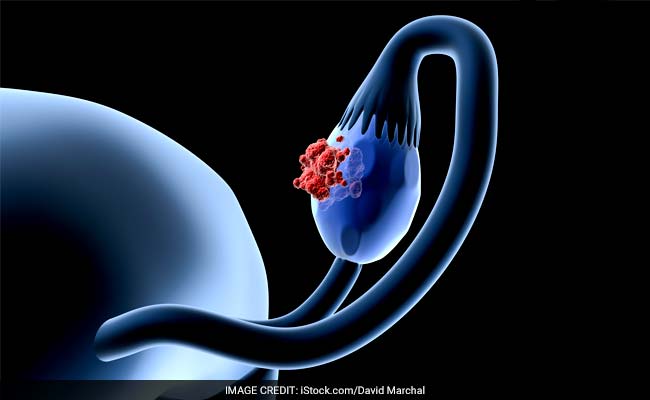Genes on the X-chromosome get potentially passed down through the father to his daughter, thus increasing the risk of ovarian cancer in girls

Ovarian cancer can be passed from fathers to their daughters
HIGHLIGHTS
- Scientists have found a gene responsible for ovarian cancer
- This can be passed down from fathers to their daughters
- Genes on the X-chromosome get passed down through the father to daughter
Scientists have found a gene responsible for ovarian cancer that can be passed down from fathers to their daughters. The study found that genes on the X-chromosome get potentially passed down through the father to his daughter, thus increasing the risk of ovarian cancer in girls. A mutation on the X-chromosome may also advance ovarian cancer's age of onset by more than six years.
"Our study may explain why we find families with multiple affected daughters: because a dad's chromosomes determine the sex of his children, all of his daughters have to carry the same X-chromosome genes," said Kevin H. Eng, Assistant Professor at Roswell Park Comprehensive Cancer Centre in Buffalo, the US.
The study, published in the journal PLOS Genetics, stated that the genetic mutation inherited from the paternal grandmothers were also associated with higher rates of prostate cancer in fathers and sons as well.
The researchers collected information about pairs of granddaughters and grandmothers and sequenced portions of the X-chromosome from 186 women affected by cancer.
The results proposed that a gene on the X-chromosome may contribute to a woman's risk of developing ovarian cancer, independently of other known susceptibility genes, such as the BRCA genes.
This observation suggests that there may be many cases of seemingly sporadic ovarian cancer that are actually inherited, and may lead to improved cancer screening and better genetic risk assessment.
However, future studies will be needed to confirm the identity and function of this gene.
"What we have to do next is make sure we have the right gene by sequencing more families. This finding has sparked a lot of discussion within our group about how to find these X-linked families," Eng said.
"It's an all-or-none kind of pattern: A family with three daughters who all have ovarian cancer is more likely to be driven by inherited X mutations than by BRCA mutations," Eng noted.
(This story has not been edited by NDTV staff and is auto-generated from a syndicated feed.)
DoctorNDTV is the one stop site for all your health needs providing the most credible health information, health news and tips with expert advice on healthy living, diet plans, informative videos etc. You can get the most relevant and accurate info you need about health problems like diabetes, cancer, pregnancy, HIV and AIDS, weight loss and many other lifestyle diseases. We have a panel of over 350 experts who help us develop content by giving their valuable inputs and bringing to us the latest in the world of healthcare.














